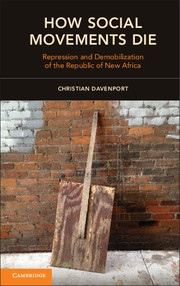5 - We Shall Overcome?
From GOAL to the Freedom Now Party
Published online by Cambridge University Press: 05 December 2014
Summary
To understand the RNA, one has to address the role of four people. On one hand, there were two biological brothers (discussed in this chapter), Milton and Richard Henry. These two were the core around which the organization would form as well as the poles around which the organization would split and later dissolve. On the other hand, there were two spiritual “fathers” (discussed in the next chapter), Malcolm X and Robert F. Williams. These two, in their own ways, contributed to the complex and often contradictory vision pursued and the strategies adopted by the organization, including the RNA’s approach to repressive reappraisal. As we attempt to understand the end of the RNA and what role repression played in its demise, we must first consider these individuals as well as those who associated with them. This sets the stage for an analysis of what happened to and within the Republic, which follows in Part IV.
Brothers in Struggle
At first glance, it seems strange that the Henry brothers (Edwin, Lester, Charles, Milton, Donald, Julian, Richard, and Laurence) would be associated with black power and nationalism as well as trying to secede from the United States, because for much of their lives, they seemed like the poster children for integration and the civil rights movement. Having grown up in Philadelphia, Pennsylvania, in the 1920s and early 1930s, they were born and raised in a working-class, two-parent household with a father (Walter Henry) who was employed by the U.S. Post Office for forty-three years (first as a deliverer and later as a clerk) and a mother (Vera Neville Robinson) who stayed at home to raise the children. All members of the family attended church routinely. Indeed, the family was intricately linked to the erection of the first Union Baptist Church on Little Pine Street through their Great Aunt Susan, a fact that was a source of great pride. All of the boys were hardworking, but each moved in a distinct direction professionally. All would become interested in education to some degree and would achieve varying levels of success. Indeed, in almost every way, the Henrys were groomed for entry into the dominant white society, seemingly from birth. When, in the 1950s, the family was identified as the Detroit National Urban League’s “Family of the Year,” it would come as no surprise to anyone – especially them. They had literally worked for that recognition for years.
- Type
- Chapter
- Information
- How Social Movements DieRepression and Demobilization of the Republic of New Africa, pp. 111 - 131Publisher: Cambridge University PressPrint publication year: 2014



